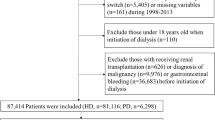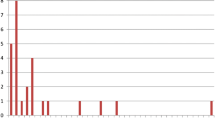Abstract
Purpose
Gastrointestinal bleeding remains the leading cause of morbidity and mortality for patients who need hemodialysis treatment. Our aim was to evaluate patients who needed hemodialysis and presented with bleeding during their hospital stay (uremic bleeding patients). Factors that increased the risk of bleeding and death were evaluated. Additionally, uremic bleeding patients were compared to non-uremic bleeding patients regarding gastrointestinal findings.
Patients and methods
Fifty-one uremic bleeding patients were compared to two control groups which included uremic (hemodialysis dependent and non-bleeding) and non-uremic (no renal insufficiency and bleeding) patients.
Results
NSAIDs and anti-ulcer drug usage were more common in uremic bleeding and in uremic non-bleeding groups, respectively. Dialysis vintage was longer in uremic bleeding group. Comparison of uremic bleeding and non-bleeding uremic patients regarding the usage of ACEI or ARB drugs yielded non-significant results. Acute kidney injury, lower plasma albumin level and high CRP level were significantly increased the risk of mortality in uremic bleeding patients. Hospital stay more than 1 week was the only strong factor for mortality when multivariate analysis was performed. Gastroduodenal and duodenal ulcers were significantly detected in uremic bleeding and non-uremic bleeding patients; respectively.
Conclusions
Hemodialysis patients presenting with gastrointestinal bleeding should be evaluated regarding use of prescriptions and efforts should be done in order to shorten their hospital stay and decrease their mortality. Effect of ACEI or ARB drugs should also be evaluated in future studies.
Similar content being viewed by others
References
Sood P, Kumar G, Nanchal R et al (2012) Chronic kidney disease and end-stage renal disease predict higher risk of mortality in patients with primary upper gastrointestinal bleeding. Am J Nephrol 35:216–224
Cheung J, Yu A, LaBossiere J, Zhu Q et al (2010) Peptic ulcer bleeding outcomes adversely affected by end-stage renal disease. Gastrointest Endosc 71:44–49
Bang CS, Lee YS, Lee YH et al (2013) Characteristics of nonvariceal upper gastrointestinal hemorrhage in patients with chronic kidney disease. World J Gastroenterol 19:7719–7725
Lee YJ, Kim ES, Hah YJ et al (2013) Chronic kidney disease, hemodynamic instability, and endoscopic high-risk appearance are associated with 30-day rebleeding in patients with non-variceal upper gastrointestinal bleeding. J Korean Med Sci 28:1500–1506
Huang KW, Leu HB, Luo JC et al (2014) Different peptic ulcer bleeding risk in chronic kidney disease and end-stage renal disease patients receiving different dialysis. Dig Dis Sci 59:807–813
Jankovic SM, Aleksic J, Rakovic S et al (2009) Non-steroidal anti-inflammatory drugs and risk of gastro-intestinal bleeding among patients on hemodialysis. J Nephrol 22:502–507
Ethier J, Bragg-Gresham JL, Piera L et al (2007) Aspirin prescription and outcomes in hemodialysis patients: the dialysis outcomes and practice patterns study (DOPPS). Am J Kidney Dis 50:602–611
Wasse H, Gillen DL, Ball AM et al (2003) Risk factors for upper gastrointestinal bleeding among end stage renal disease patients. Kidney Int 64:1455–1461
Lai KC, Lam SK, Chu KM et al (2002) Lansoprazole for the prevention of recurrences of ulcer complications from long-term low-dose aspirin use. N Engl J Med 346:2033–2038
Chan FK, Chung SC, Suen BY et al (2001) Preventing recurrent upper gastrointestinal bleeding in patients with Helicobacter pylori infection who are taking low-dose aspirin or naproxen. N Engl J Med 344:967–973
National Nephrology, Dialysis and Transplantation Registry Report of Turkey 2013
Fukunaga K (2001) Refractory gastrointestinal bleeding treated with thyroid hormone replacement. J Clin Gastroenterol 33(2):145–147
Lim H, Kim JH, Baik GH et al (2015) Effect of low-dose proton pump inhibitor on preventing upper gastrointestinal bleeding in chronic kidney disease patients receiving aspirin. J Gastroenterol Hepatol 30(3):478–484
Song YR, Kim HJ, Kim JK et al (2015) Proton-pump inhibitors for prevention of upper gastrointestinal bleeding in patients undergoing dialysis. World J Gastroenterol 16:4919–4924
Luo JC, Leu HB, Huang KW et al (2011) Incidence of bleeding from gastroduodenal ulcers in patients with end-stage renal disease receiving hemodialysis. Can Med Assoc J 183:1345–1351
Wu CY, Wu MS, Kuo KN et al (2011) Long-term peptic ulcer rebleeding risk estimation in patients undergoing haemodialysis: a 10-year nationwide cohort study. Gut 60:1038–1042
Marques de Mattos A, Marino LV, Ovidio PP et al (2012) Protein oxidative stress and dyslipidemia in dialysis patients. Ther Apher Dial. 16:68–74
Samouilidou EC, Grapsa EJ, Kakavas I et al (2003) Oxidative stress markers and C-reactive protein in endstage renal failure patients on dialysis. Int Urol Nephrol 35:393–397
Kang JM, Kim N, Kim JH, Oh E, Lee BY, Lee BH et al (2010) Effect of aging on gastric mucosal defense mechanisms: ROS, apoptosis, angiogenesis, and sensory neurons. Am J Physiol Gastrointest Liver Physiol 299:1147–1153
Fliers E, Bianco AC, Langouche L, Boelen A (2015) Thyroid function in critically ill patients. Lancet Diabetes Endocrinol 3(10):816–825
Bregonzio C, Armando I, Ando H et al (2004) Angiotensin II AT1 receptor blockade prevents gastric ulcers during cold-restraint stress. Ann N Y Acad Sci 1018:351–355
Ender F, Labancz T, Rosivall L (1993) Protective effects of the inhibition of the renin–angiotensin system against gastric mucosal lesions induced by coldrestraint in the rat. Acta Physiol Hung 81:13–18
Shiotani A, Sakakibara T, Yamanaka Y et al (2009) Upper gastrointestinal ulcer in Japanese patients taking low-dose aspirin. J Gastroenterol 44:126–131
Chou CY, Wang SM, Chang PH, Kuo HL, Chang CT, Liu JH et al (2015) Angiotensin II receptor blocker prevents upper gastrointestinal bleeding in hypertensive patients with chronic kidney disease not on dialysis. Int J Clin Pract 69:722–728
Barrantes F, Feng Y, Ivanov O, Yalamanchili HB, Patel J, Buenafe X et al (2009) Akut kidney injury predicts outcomes of non-critically ill patients. Mayo Clin Proc 84:410–416
Author information
Authors and Affiliations
Corresponding author
Ethics declarations
Conflict of interest
We have no conflict of interest to declare.
Ethical approval
All procedures performed in studies involving human participants were in accordance with the ethical standards of the Second Hospital of Jilin University and with the 1964 Helsinki declaration and its later amendments or comparable ethical standards.
Informed consent
Informed consent was obtained from all individual participants included in the study.
Rights and permissions
About this article
Cite this article
Can, Ö., Koç, G., Ocak, S.B. et al. Gastrointestinal bleeding in patients with renal failure under hemodialysis treatment: a single-center experience. Int Urol Nephrol 49, 889–894 (2017). https://doi.org/10.1007/s11255-017-1517-y
Received:
Accepted:
Published:
Issue Date:
DOI: https://doi.org/10.1007/s11255-017-1517-y




